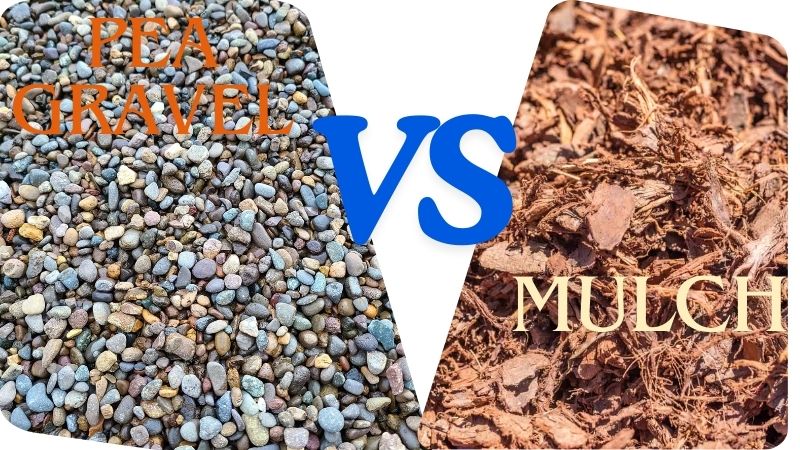When you want to enhance your outdoor space, pea gravel vs mulch are two materials that cannot be overlooked. Both provide many benefits to the garden, from protecting soil and retaining moisture to improving aesthetics. However, each type has different characteristics and applications, suitable for each gardener’s needs and style. In this article, Garden Creatives will learn in detail about pea gravel vs mulch, thereby helping you have a comprehensive view and make the most suitable choice for your garden.
What is mulch?
Vegetative mulch comes in many different forms such as wood chips, rubber chips, bark chips and organic mulches such as grass clippings and pine needles. In the UK, bark chips or shredded bark are the most common type and are often used in DIY gardening projects. The main function of plant mulch is to create a protective layer on the soil surface, helping to retain moisture, prevent evaporation and minimize weed growth.
Vegetative mulch also provides nutrients to the soil as it decomposes, making the soil more fertile. This is very useful for growing plants and flowers, helping plants grow healthy and lush. Furthermore, plant mulch also creates a natural and warm look for the garden, helping to blend into the surrounding environment and create a feeling of closeness to nature.
What is pea gravel?
Pea gravel, which consists of small stones approximately the size of a pea, is a popular landscaping material for a variety of projects. Pea gravel comes in many colors and sizes, from small bags at the garden center to large bags delivered by pick-up trucks. One of the biggest benefits of pea gravel is its durability. Unlike plant mulch, pea gravel does not decompose over time, so it does not need to be replaced regularly.
Pea gravel also helps improve drainage, prevents waterlogging and reduces the risk of soil erosion. Aesthetically, pea gravel provides a neat and modern look, suitable for many landscape styles, from traditional to modern. Using pea gravel in the garden not only helps create a focal point but is also easy to maintain and clean.
Advantages and disadvantages of mulch
Advantage
A significant advantage of vegetative mulch is its ability to suppress weed growth by blocking sunlight and preventing weed seeds from germinating. This natural weed barrier reduces the need for herbicides and manual weeding, resulting in healthier garden plants and flower beds.
Organic mulches help retain soil moisture, reduce irrigation frequency, and provide a stable environment for garden plants, especially during hot summers or periods of drought. The organic material in this mulch slowly decomposes over time, enriching the soil with essential nutrients and improving overall soil health.
Mulch also contributes to controlling soil erosion by reducing water flow and protecting the soil surface from heavy rain and erosion during cold winters. Its natural appearance blends perfectly with garden paths and doorways, enhancing the overall aesthetic appeal of your outdoor space.
Defect
Mulch does not promote good drainage.
Mulch does not last as long as gravel because it will rot.
Mulch is not as durable as stone – it can be blown away or displaced by animals.
Advantages and disadvantages of pea gravel
Advantage
One of the main advantages of pea gravel is its durability and low maintenance requirements. Unlike organic mulch, which can decompose over time, pea gravel retains its appearance and function for many years without requiring much maintenance. Pea gravel offers versatility in landscape design, with a variety of colors and textures to suit a variety of architectural styles and outdoor themes.
Defect
It’s difficult to walk on pea gravel without shoes. Pea gravel is also more expensive than organic mulch. Additionally, pea gravel can retain heat in the sun and requires appropriate edging to hold it in place.
Pea gravel vs mulch: which is better?
When choosing between plant mulch and pea gravel, consider the following factors:
Durability: Pea gravel is more durable and requires less maintenance than vegetable mulch.
Retaining moisture and nutrients: Plant mulch helps retain moisture and provide nutrients to the soil, suitable for gardens growing plants and flowers.
Aesthetics: Vegetable mulch provides natural beauty, while pea gravel creates a clean and modern appearance.
Prevent weeds: Both can prevent weeds, but vegetative mulch may need to be added over time.
Drainage: Pea gravel has better drainage, helping to prevent waterlogging and soil erosion.
Ultimately, choosing between pea gravel vs mulch depends on the specific needs of your landscaping project. If you prioritize a garden that is rich in nutrients, maintains good humidity, and has natural beauty, mulch is the ideal choice. On the contrary, if you want a solution that is sustainable, low maintenance, and creates a modern look, pea gravel would be a more suitable choice.
Whatever your choice, make sure you carefully consider the factors involved in creating a beautiful outdoor space that suits your lifestyle. A well-maintained garden is not only a place of relaxation but also the pride of any gardener.
Conclude
Choosing pea gravel vs mulch depends on many factors such as intended use, design style, budget and environmental conditions. Mulch provides many ecological and aesthetic benefits, and helps maintain soil moisture and nutrients. Meanwhile, pea gravel stands out for its durability and low maintenance, making it suitable for high-traffic areas. Hopefully through this article, you will have more information to choose the most suitable material for your outdoor space, creating a beautiful and sustainable garden or walkway.





